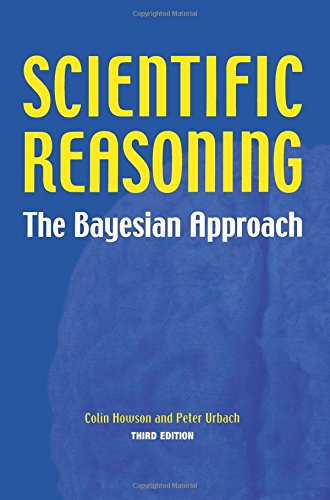Scientific Reasoning: The Bayesian Approach pdf
Par williams betty le dimanche, août 14 2016, 22:26 - Lien permanent
Scientific Reasoning: The Bayesian Approach . Colin Howson, Peter Urbach

Scientific.Reasoning.The.Bayesian.Approach..pdf
ISBN: 081269578X,9780812695786 | 340 pages | 9 Mb

Scientific Reasoning: The Bayesian Approach Colin Howson, Peter Urbach
Publisher: Open Court
Jacques Poitevineau & Bruno Lecoutre (1998). Some Statistical Misconceptions in Chow's Statistical Significance. Kenneth Allen Hopf says: August 7, 2012 at 8:31 pm. Howson, Colin and Peter Urbach (1989): Scientific Reasoning: the Bayesian Approach.Illinois:Open Court (second edition 1993). It seemed like a good place to start to learn Bayesian reasoning, although I don't know where the "normal" place to start would be. Behavioral and Brain Sciences 21 (2):215-215. Dowe, Steve Gardner, and Graham Oppy (2007), Bayes not Bust! This is especially so from a Bayesian point of view, and I much enjoyed reading a clear and formal (and not so new) exposition of this. Á�い,ベイジアンな科学哲学本です.初版(1989)と第2版(1993)に続く第3版の目玉は,最終章の「反撃」部分か.もうひとつのバクダンも同時着弾した:David L. I'm currently reading "Scientific Reasoning: The Bayesian Approach" by Howson and Urbach. Howson, Colin and Urbach, Peter, Scientific Reasoning The Bayesian Approach, Second Edition, Open Court Publishing 1996. Scientific.Reasoning.The.Bayesian.Approach..pdf. Scientific Reasoning: The Bayesian Approach. In this philosophy, scientific reasoning is said to depend on making generalizations or inductions from observations to general laws of nature; the observations are said to induce the formulation of a natural law in the mind of the scientist. I remain very interested in this question of the formalisation of scientific reasoning, and – following the original Robot Scientist paper – a new article sets down such an approach and its application to the (more or less) automated reuse of scientific knowledge. I've complained before that philosophy is a diseased discipline which spends far too much of its time debating definitions, ignoring relevant scientific results, and endlessly re-interpreting old dead guys who didn't know the slightest bit of 20th century science. Ian Hacking (1983): Representing and Intervening.Cambridge:Cambridge UP. I still don't see this as sufficiently different from a blue-green tribal fight - there's a lot of "quantitative/Bayesian approaches are the way to go, and everyone else sucks". Dr Howson, among other important works, published with Dr.